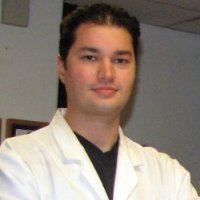Gustavo Assi is a Naval Architect and Ocean Engineer at the University of São Paulo in Brazil. Here he explains how his faith is relevant to his work, and how he tries to bring scientific conversations to the church.
In the same way that faith brings purpose to my research and helps me to think about difficult issues, my research brings colour to my faith. It brings the same kind of pleasure and awe that I feel when I am worshipping in my church with a choir and orchestra playing. It’s so colourful, so rich, so enjoyable, and it helps me appreciate that God is there being worshipped! The same thing happens when I am working in the lab, and it makes my faith much stronger.
I can see colleagues of mine who have stopped at the rational level. They’re very happy and successful, we have interesting discussions about our work and it’s very productive. But I do think I have more pleasure in my research because – although we can reach the same conclusions – when I see these things I get to know and feel a bit more of God’s creation.
When explaining my views to my colleagues, I normally like to start with beauty. I believe our capacity to appreciate things and find them beautiful is inherited from God. We live in the Creation, and are able to see that it is beautiful. It is difficult to define beauty. People have thought about symmetry, or about shades of colour in the past. The concept changes with time and culture, but beauty is always there, and it is common to humankind – and not just to Christians.
My colleague can see that something is beautiful, but he does not know that the source of this beauty is the beauty of God. So when I find something scientifically beautiful (meaning intelligible), I will point it out to my colleague or student, saying, “Why do you think you find this thing beautiful? Have you realised that everybody you ask here in the lab will say it is beautiful, yet we are so different in our beliefs and values.” And then that person will respond, “Oh, that’s true.”
Then I might ask, “If you run this experiment tomorrow, do you think the result will still be the same?” In engineering our experiments are very repeatable, so long as you don’t change the variables too much, so he says “Yes, of course.” “And if you run this experiment in a century, it’d be the same?” “Yes, probably the same.”
“So why is this?” I ask, “What holds these things together? Is there is something behind them?” And they might respond, “Yes there must be something behind them – the laws of the universe.” “Yes” I reply, “and these laws of the universe, where did they come from?” In the lab we are discovering something that is, as John Polkinghorne says, “in the fabric of the Universe”. There’s something there – though it takes us a [while] to find it and some lenses to see it.
For me, this conversation about reason, order and beauty touches on something in us that points to God. Of course, to understand God fully, you have to know Jesus Christ. Creation reveals the glory of God, but this glory is only fully appreciated by those who know Christ as Saviour. Otherwise it’s just something beautiful in itself.
In the same way that I have had this kind of spiritual experiences in the lab, I’m trying to have “scientific experiences” in my church. Talking about science within a Christian worldview during adult Sunday school classes and the young adults group is already helping some people to become aware of this topic. My friends in the youth adults group and others who are starting university life are particularly interested and open to learn and investigate.
There’s a strong movement in the Reformed churches to say that “You are an integral Christian in everything you do”, and that includes science. Materials like Test of FAITH are extremely useful, especially for the young people who are in college. So I try to do this scientific ‘mission’ into the Christian world, and I hope it will make a difference for the next generation of scientists and also Christians who will come across science in their lives.





